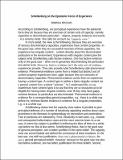Files in this item
Schellenberg on the epistemic force of experience
Item metadata
| dc.contributor.author | McGrath, Matthew | |
| dc.date.accessioned | 2016-08-28T23:34:32Z | |
| dc.date.available | 2016-08-28T23:34:32Z | |
| dc.date.issued | 2016-04 | |
| dc.identifier | 215729582 | |
| dc.identifier | 0f4a4871-15b3-4ad4-ba1f-6855249626cc | |
| dc.identifier | 84961129201 | |
| dc.identifier.citation | McGrath , M 2016 , ' Schellenberg on the epistemic force of experience ' , Philosophical Studies , vol. 173 , no. 4 , pp. 897-905 . https://doi.org/10.1007/s11098-015-0529-7 | en |
| dc.identifier.issn | 0031-8116 | |
| dc.identifier.uri | https://hdl.handle.net/10023/9389 | |
| dc.description.abstract | According to Schellenberg, our perceptual experiences have the epistemic force they do because they are exercises of certain sorts of capacity, namely capacities to discriminate particulars—objects, property-instances and events—in a sensory mode. She calls her account the ‘‘capacity view.’’ In this paper, I will raise three concerns about Schellenberg’s capacity view. The first is whether we might do better to leave capacities out of our epistemology and take content properties as the fundamental epistemically relevant features of experiences. I argue we would. The second is whether Schellenberg’s appeal to factive and phenomenal evidence accommodates the intuitive verdicts about the bad case that she claims it does. I argue it does not. The third is whether Schellenberg’s account of factive evidence is adequate to capture nuances concerning the justification for singular but non demonstrative perceptual beliefs, such as the belief that’s NN, where NN is a proper name. I argue it is not. If I am right, these points suggest a mental-state-first account of perceptual justification, rather than a capacity-first account, and one which treats the good and bad cases alike in respect of justification and complicates the relation between perceptual content and what one is justified in believing. | |
| dc.format.extent | 9 | |
| dc.format.extent | 391354 | |
| dc.language.iso | eng | |
| dc.relation.ispartof | Philosophical Studies | en |
| dc.rights | © Springer Science+Business Media Dordrecht 2015. This work is made available online in accordance with the publisher’s policies. This is the author created, accepted version manuscript following peer review and may differ slightly from the final published version. The final published version of this work is available at https://dx.doi.org/10.1007/s11098-015-0529-7 | en |
| dc.subject | Evidence | en |
| dc.subject | Perceptual Justification | en |
| dc.subject | Perception | en |
| dc.subject | Content of Experience | en |
| dc.subject | B Philosophy (General) | en |
| dc.subject.lcc | B1 | en |
| dc.title | Schellenberg on the epistemic force of experience | en |
| dc.type | Journal article | en |
| dc.contributor.institution | University of St Andrews.School of Philosophical, Anthropological and Film Studies | en |
| dc.contributor.institution | University of St Andrews.Philosophy | en |
| dc.identifier.doi | 10.1007/s11098-015-0529-7 | |
| dc.description.status | Peer reviewed | en |
| dc.date.embargoedUntil | 2016-08-28 |
This item appears in the following Collection(s)
Items in the St Andrews Research Repository are protected by copyright, with all rights reserved, unless otherwise indicated.

